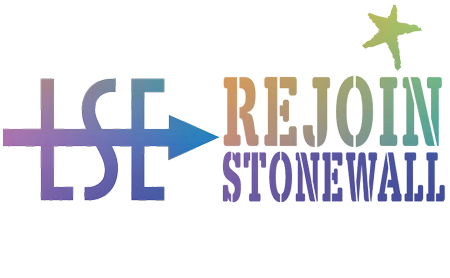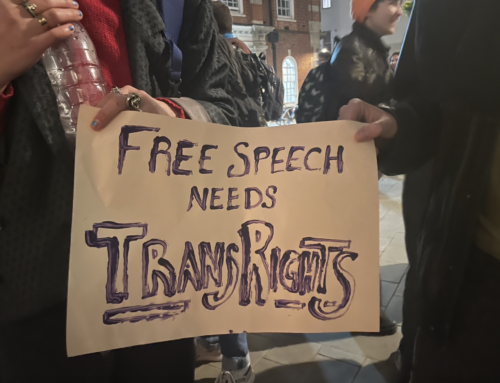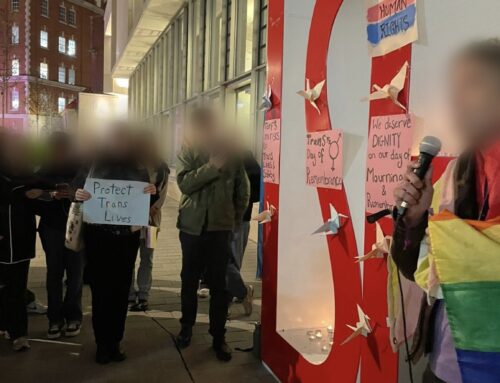The LSE official statement on leaving Stonewall, and its woes
The LSE Senior Management Committee (SMC) attempted to quietly disaffiliate from Stonewall in a message to its LGBTQ+ leadership on 8 December 2022, right before a School holiday and without formal consultation with the LGBTQ+ staff network, the LGBTQ+ Steering Group, the unions, or the academic board.
This was met with considerable outrage and a social media spiral.
So, on 19 January, the SMC finally released a public statement about Stonewall in a Staff News bulletin in the form of an “open letter to the Spectrum network”. This letter was posted publicly on the LSE website, and contains such a large amount of misinformation and problematic remarks that we endeavour to correct it below. The entire statement is archived here.
The statement begins by acknowledging there remain “questions and concerns” about leaving Stonewall:
Following the winter break, we understand that there are questions and concerns from some members of the LSE community about the School Management Committee (SMC) decision to not renew our Stonewall membership. Below, we include an open letter to the Spectrum network from SMC which sets out this decision and next steps.
Senior managers then give the first public statement acknowledging their plan to disaffiliate, making clear that they had interviewed some people around the School. This was done in an entirely informal way, without any official consultation of the School’s LGBTQ+ groups, students, or unions.
This is problematic because the views of those powerful “gender critical” professors—which do not represent the School community or its designated representatives—come to play an unfair and undemocratic role in policy:
We wanted to let you know that following discussions across our School community, and after careful consideration of the range of perspectives shared, LSE’s School Management Committee has taken the decision to not renew our institutional membership to Stonewall.
They go on to state their reasons. After dropping to a dismal 127th place in their last Stonewall evaluation, the LSE decided to review its participation in the index. Their first finding in this review appears to be that the Stonewall Workplace Equality Index is about staff, not students. Since they should be including students in their activities, Stonewall is not the appropriate way to proceed.
This is a non-sequitur: nothing about Stonewall prevents the LSE from improving conditions for LGBTQ+ students (if only they genuinely would):
As outlined previously, after our most recent Workplace Equality Index submission LSE wanted to review whether we are receiving a good service from Stonewall as part of our annual membership renewal. At the same time, we committed to taking forward actions from our 2021-2022 submission to create meaningful change now, broadening our approach to identify student initiatives which our workplace equality submission does not cover as a staff-focused programme of activity.
They follow this with their second reason, suggesting implicitly that the problem is that Stonewall’s work to improve LGBTQ+ rights is incompatible with freedom of speech, a suggestion that they had made explicit in a meeting a few days earlier:
Engagement with colleagues as part of this review brought forward many varied views on Stonewall from across LSE, including amongst our LGBTQ+ staff community. After extensive and thoughtful reflection upon all perspectives, SMC believe the best way to ensure ongoing advancement of equity, diversity and inclusion, which includes sustaining LSE as a place for the free exchange of ideas and academic discussion, is through not renewing our membership.
This is because LSE’s role as an institution is to enable us all to come together to discuss, effect change and challenge through education practices, academic research and rigorous debate. This is within a framework of tolerance for different points of view, alongside dedicated work to make sure our policies and practices enhance the experiences of all across our School and support our community.
They finally suggest that, when given the choice between supporting LGBTQ+ staff through Stonewall on the one hand, and doing nothing on the other hand, the “neutral stance” is to do nothing—a suggestion which would not hold water in a first-year philosophy course, where it is well-known that the moral difference between “allowing harm” by doing nothing is rarely better than “doing harm”:
Our focus must be how we sustain LSE as a place where all these endeavours are realised, rather than taking any stance or implied alignment with external bodies that reflect one position in a complex and sensitive area, which impacts our LSE community. At the same time, we want to take a School-wide approach that considers all experiences from across our institution, in line with our strategic priority to develop LSE for everyone and Ethics Code. Stonewall’s Workplace Equality Index is a staff-focused framework that does not cover student and alumni matters.
Their next-steps make clear again that they see themselves as balancing LGBTQ+ rights on the one hand, and “freedom of academic inquiry” on the other hand:
As a leadership team, SMC gave a clear directive that we must build on what we do at our School to create an inclusive environment where every individual, including LGBTQ+ students and staff, can work, study and thrive, all while feeling valued and supported. This must – and will – remain our approach, alongside ensuring freedom of academic enquiry, thought and speech within the law.
What sort of “freedom” do they have in mind? It is hard to imagine that it bodes well for LGBTQ+ rights.



